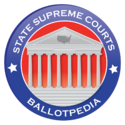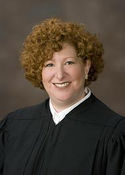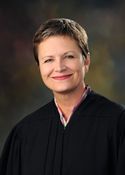Kansas Supreme Court justice vacancy (September 2020)
| Kansas Supreme Court |
|---|
| Beier vacancy |
| Date: September 18, 2020 |
| Status: Seat filled |
| Nomination |
| Nominee: Melissa Standridge |
| Date: November 30, 2020 |
Kansas Governor Laura Kelly (D) appointed Melissa Standridge to the Kansas Supreme Court on November 30, 2020. Standridge succeeded Justice Carol Beier, who retired on September 18, 2020. Standridge was Gov. Kelly's third nominee to the seven-member supreme court.
At the time of the appointment, the governor would select a supreme court justice from a list submitted by the Kansas Supreme Court Nominating Commission.
Ballotpedia has compiled the following resources on the process to fill the Kansas Supreme Court vacancy:
- An overview of the appointee.
- A list of finalists recommended to the governor.
- A list of candidates who applied to the vacancy.
- An overview of the selection process.
- An overview of the court following the vacancy.
- An overview of the justice who left office.
- An overview of the Kansas Supreme Court.
- A list of other state supreme court appointments in 2020.
The appointee
- See also: Melissa Standridge
Standridge was a judge on the Kansas Court of Appeals from 2008 to 2020. She was appointed to that court by Governor Kathleen Sebelius (D). Before that, Standridge was chambers counsel for Magistrate Judge David Waxse of the United States District Court for the District of Kansas from 1999 to 2008; an attorney for Shook, Hardy & Bacon from 1995 to 1999; and chambers counsel for Judge Elmo Hunter of the United States District Court for the Western District of Missouri from 1993 to 1995.[1]
Standridge earned a bachelor’s degree in business administration from the University of Kansas in 1984. She received a J.D. from the University of Missouri-Kansas City School of Law, where she served as the editor-in-chief of the Law Review.[1]
Appointee candidates and nominations
Finalists
The Kansas Supreme Court Nominating Commission recommended three candidates to Gov. Kelly on October 6, 2020. The governor had 60 days to select a final nominee.[2]
- Judge Kim Cudney of the Kansas 12th Judicial District
- Judge Melissa Standridge of the Kansas Court of Appeals
- Attorney Kristen Wheeler of Wichita
Applicants
Eleven candidates—three judges and eight attorneys—applied to fill the position.[3]
- Attorney Victor Braden of Lawrence
- Attorney Christi Bright of Overland Park
- Attorney Meryl Carver-Allmond of Lawrence
- Judge Kim Cudney of the Kansas 12th Judicial District
- Attorney Dennis Depew of Neodesha
- Attorney Randall Hodgkinson of Topeka
- Attorney Russell Keller of Fairway
- Judge Cheryl Rios of the Kansas 3rd Judicial District
- Judge Melissa Standridge of the Kansas Court of Appeals
- Attorney Kristen Wheeler of Wichita
- Attorney Marcia Wood of Wichita
The selection process
- See also: Judicial selection in Kansas
At the time of the appointment, state supreme court justices in Kansas were selected through the assisted appointment method. The governor would select a replacement from a list of three individuals submitted by the Kansas Supreme Court Nominating Commission. Newly appointed justices would serve for at least one year, after which they had to run for retention in the next general election. Subsequent terms would last for six years.
Kansas Supreme Court Nominating Commission
At the time of the appointment, the Kansas Supreme Court Nominating Commission was a nine-member independent body created by the Kansas Constitution to recommend individuals to the Kansas governor for appointment to the state supreme court.[4]
When a vacancy opened on the court, the commission would review applications and interviews candidates in public hearings. The commission would then recommend three candidates to the governor.[4]
As of July 2020, the commission had nine members: four of the commission's members were required to be non-attorneys and were appointed by the governor, while the other four were attorneys selected by members of the bar in each of the state's four congressional districts. The chair of the commission, the ninth member, was a lawyer chosen in a statewide vote of lawyers who belong to the Kansas Bar Association.[4]
Makeup of the court
- See also: Kansas Supreme Court
Following Beier's retirement, the Kansas Supreme Court included the following members:
| ■ Marla Luckert | Appointed by Gov. Bill Graves (R) in 2002 | |
| ■ Eric Rosen | Appointed by Gov. Kathleen Sebelius (D) in 2005 | |
| ■ Daniel Biles | Appointed by Gov. Sebelius in 2009 | |
| ■ Caleb Stegall | Appointed by Gov. Sam Brownback (R) in 2014 | |
| ■ Evelyn Z. Wilson | Appointed by Gov. Laura Kelly in 2019 | |
| ■ Keynen Wall | Appointed by Gov. Kelly in 2020 |
About Justice Beier
- See also: Carol Beier
Beier joined the Kansas Supreme Court in 2003 after being appointed by Gov. Kathleen Sebelius (D). Prior to her appointment to the court, Beier was a judge on the Kansas Court of Appeals from 2000 to 2003. Before that, she worked in private practice, received the Revson fellowship to the Georgetown Law Center Women's Rights and Public Policy Program, and was a law clerk to Judge James Logan on the United States Court of Appeals for the 10th Circuit.[5][6]
Beier attended Benedictine College and received her B.S. in journalism from the University of Kansas, Lawrence. She earned her J.D. from the University of Kansas School of Law in 1985 and her LL.M. from the University of Virginia School of Law in 2004.[5][6]
Political outlook
In October 2012, political science professors Adam Bonica and Michael Woodruff of Stanford University attempted to determine the partisan ideology of state supreme court justices. They created a scoring system in which a score above 0 indicated a more conservative-leaning ideology, while scores below 0 were more liberal.
Beier received a campaign finance score of -0.81, indicating a liberal ideological leaning. This was more liberal than the average score of 0.12 that justices received in Kansas.
The study was based on data from campaign contributions by the judges themselves, the partisan leaning of those who contributed to the judges' campaigns, or, in the absence of elections, the ideology of the appointing body (governor or legislature). This study was not a definitive label of a justice, but an academic summary of various relevant factors.[7]
Kansas Supreme Court
- See also: Kansas Supreme Court
Founded in 1861, the Kansas Supreme Court is the state's court of last resort and has seven judgeships. The current chief of the court is Eric Rosen. [8]
As of September 2025, five judges on the court were appointed by a Democratic governor and two judges were appointed by a Republican governor.
The Kansas Supreme Court meets in the Kansas Judicial Center in Topeka, Kansas.[9]
In Kansas, state supreme court justices are selected through assisted appointment with a bar-controlled judicial nominating commission. Justices are appointed by the governor with the assistance of a commission with a majority of members selected by the state Bar Association. This is the only state using this selection method. To read more about the assisted appointment of judges, click here.
Other state supreme court appointments in 2020
- See also: State supreme court vacancies, 2020
The following table lists vacancies to state supreme courts that opened in 2020. Click the link under the Court column for a particular vacancy for more information on that vacancy.
Click here for vacancies that opened in 2021.
See also
External links
Footnotes
- ↑ 1.0 1.1 Office of the Governor, Kansas, "Governor Laura Kelly Appoints Melissa Taylor Standridge to the Kansas Supreme Court," November 30, 2020
- ↑ Kansas Judicial Branch, "Supreme Court Nominating Commission selects nominees to send to governor," October 5, 2020
- ↑ WIBW.com, "Eleven compete for September Supreme Court Vacancy," September 3, 2020
- ↑ 4.0 4.1 4.2 Kansas Judicial Branch, "Nominating Commissions," accessed June 26, 2020
- ↑ 5.0 5.1 Kansas Judicial Branch, "Honorable Carol A. Beier Justice," accessed August 5, 2016
- ↑ 6.0 6.1 Project Vote Smart, "Justice Carol S. Beier (KS)"
- ↑ Stanford University, "State Supreme Court Ideology and 'New Style' Judicial Campaigns," October 31, 2012
- ↑ Kansas Judicial Branch, "Justice Eric Rosen to take oath of office," accessed January 6, 2026
- ↑ Kansas Judicial Branch, "Visit the Judicial Center," accessed Sept. 25, 2021
| ||||||||||||||||||||||||||||||||||||||
Federal courts:
Tenth Circuit Court of Appeals • U.S. District Court: District of Kansas • U.S. Bankruptcy Court: District of Kansas
State courts:
Kansas Supreme Court • Kansas Court of Appeals • Kansas District Courts • Kansas Municipal Courts
State resources:
Courts in Kansas • Kansas judicial elections • Judicial selection in Kansas
| |||||||









